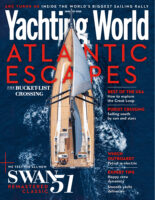Marc Guillemot has arrived on station close to Yann Eliès' yacht Generali
Marc Guillemot (Safran) arrived on station close to injured Yann Eliès last night between 22:30 and 23:00 GMT. He has been as close as 100 metres (see left), but has since been keeping a safe distance, a mile to two off – sailing a parallel course. The two boats are making around 3.5 knots on port tack under triple reefed mainsails.
Guillemot will await the arrival of the frigate HMAS Arunta, which is now due to reach them around 14:00 GMT on Saturday afternoon. Current conditions, according to Guillemot, are 3-4 metre swells running with 15-80 knots of wind and overhead visibility is good although the breeze is due to pick up later today to 35 knots.
Sam Davies, GBR, (Roxy) is also heading towards Generali and was 300 miles, or about a day’s sailing, to the west at 06:30 GMT this morning.
Separated by 30 miles Michel Desjoyeaux (Foncia) and Roland Jourdain (Veolia Environnement) continue their duel as pacemakers, now over 100 miles ahead of third placed Seb Josse (BT).
Jean-Pierre Dick (Paprec-Virbac II) completed his rudder repair yesterday morning and has been making SE to rejoin the fleet, now lying seventh having lost more than 600 miles due to his need to repair his rudder. Skippers were also notified of the changed, more northerly position of the New Zealand ice gate last night.
Marc Guillemot, explained: “Currently out here we have around 20 knots of wind, between 18 and 23. The sea is rough, but probably less than when I arrived. The sun is out, which means I can open the door up and see what is going on. I’ve had Yann on the VHF. He has been sleeping, so I took advantage to get some sleep too. So at that point I moved away from him slightly, but now we’re back close to each other with about a mile between us. I’m going to try to get close to his stern and toss him a bottle of water.”
“I’m going to stay here for as long as it takes. 3 days, 10 days, whatever. The race was yesterday. Now we’ve moved on to something else. I had a similar experience a few years ago. I’m just trying to talk to him, to reassure him. The subject doesn’t matter. He knows he can rely on me. It’s more of a psychological help than a physical one, but that’s important, because in general it’s the head that looks after the rest of the body. That will help him, while he awaits the arrival of the rescue team.”
David Adams (AUS) Safety consultant to the Vendée Globe who is in Sydney helping co-ordinate the evacuation:
How are the contingencies and planning for such eventualities developed and how long have they been in place?
For all of these round the world races we have been talking with all of the safety authorities all round the world to let them know the experience of the skippers, what the safety equipment of the boats is, what they look like. We have talked to them about where the ice gates are so that we can keep the boats close enough to land so that if a rescue is required they can get to them in a reasonable time. As far as that goes this is working relatively well. But from Yann’s point of view the pain he is in he won’t be very grateful or happy about it, but as far as the safety of the race goes it is actually working OK.
IMOCA Open 60 solo sailors are a self-reliant type of individuals?
They are a special breed. No one goes into this race expecting or wanting outside assistance. This is just one of those very rare situations where the skipper is incapacitated and he cannot do anything for himself. It is an unfortunate situation.
Is there a likelihood that Marc Guillemot may try to get on board Safran to help Yann?
The situation is that it would be far too dangerous to bring the two 60 footers together. In three to four metres swells there is lots of pitching and rolling by the two boats and the great danger is that the masts would lock, the masts could come down and the two boats would be disabled. It is better and safer that they wait until the navy arrives There is a big chance that Marc himself could get into trouble. These are big boats and big seas. There would be a danger in then getting two skippers in trouble.



